|
Chapter 4.
The English Cup Final of 1908. “Ravenous Wolves”
Hunt's reputation and record
as half-back for the Corinthians and Oxford City Reserves
were good enough for him to be selected for the England team
against Wales in the April of 1908. However, he was to
forsake this honour in order to turn out for Wolverhampton
Wanderers in the Cup Final of that year.
Kenneth Hunt had started
playing for the Wolves on a part-time basis at the start of
the 1907-8 season. Not for the last time in their history
were the Molineux Club suffering a financial crisis, and so
were undoubtedly very glad to be able to avail themselves of
the services of the very fit and keen undergraduate, who
would only accept travelling expenses, rather than
jeopardise his amateur status. Only two years before Hunt
had agreed to play, Wolves declared a mere profit of
£119.6s.8d, compared with nearly £950 made by local rivals
Smallheath, (now Burmingham City), and £2,000 by Aston
Villa.
|
|
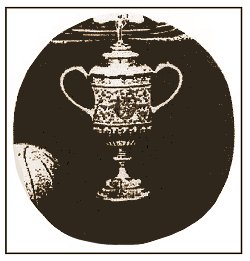
The English F.A. Cup of 1895.
|
Things did not improve over the ensuing two
years and by Christmas 1907 the town's evening paper, the
Express & Star were so concerned about the club's plight that
they offered financial assistance for the purchase of players.
Thus, the availability of someone of Hunt's experience must have
seemed like a godsend to the Wolves' Board. Hunt would finish
his studies on a Friday afternoon and make his way by train to
Wolverhampton. After spending the night at his parents' home in
Chapel Ash he would be available for team selection on the
afternoon of the following day. The Wolves team that Kenneth
Hunt joined presents a rather strange picture compared with its
modem counterpart, and if the conventions of those days were
employed by a team now the F.A. will not permit them to play in
competitive games. |
All of the Wolves players wore identical old
gold and black striped shirts, including Lunn, the goalkeeper.
It seems odd that he was the smallest man in the team. Although
he was prone to being shoulder-charged over the goal-line by
opposing forwards caught in possession of the ball, he had more
freedom of action than his modern counterpart in as much as he
could handle the ball outside his penalty area. |

An advert for football equipment from
the early 1900s. |

| Another advert
from the early 1900s. |
|
None of the players wore numbers. (This
practice only came about in 1933 when identification numbers
were needed by radio broadcasters commentating on a match.)
Training for the 'big one' seems to have been a rather
leisurely affair for the Wanderers' players compared with
the rigours a present-day team would endure. They did some
work to develop their ball skills, but Albert Fletcher, the
trainer, also organised long healthy walks in the
countryside around Matlock, (where the team were staying for
a week prior to the Final), which the players undertook
whilst dressed in three piece suits and flat caps! |
|
Considering the state of the Club's
finances, and the inability to buy 'crack players', it is
not to be wondered at that the Wolves team of 1908 were a
mediocre outfit which held a mid-way position in the second
of the two divisions that constituted the English Football
League at that time. In the previous year they had managed
to gain sixth place in the lower division, although they had
been knocked out of the Cup in an early round by Sheffield
Wednesday who were the eventual winners.
Wolves had not got a good record in the
Cup competition up to that time, having only won it once in
their history, (in 1893). Indeed, a Cup-tie against the
Wolves would have been considered a lucky omen by many
teams, as by 1908 they had been dumped out of the
competition by the eventual winners on no fewer than eight
occasions.
|
 |
| This, together with the fact that the
competition had only once before been won by a Second Division
Club, makes Wolves ultimate achievement in 1908 even more
remarkable. |
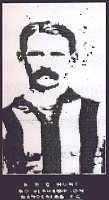
| A cigarette card
of Kenneth Hunt from c.1909. |
|
Against all odds Wolves reached the Final in
1908, fortunately winning all their matches in the previous
rounds by narrow margins. In a tie against Swindon earlier in
the year, Kenneth Hunt had come on for Wooldridge, the Wolves
skipper, who had been injured. In true heroic style he changed
the run of play, and helped Wolves snatch a victory, even though
he was knocked unconscious twice in the course of the match. The
three Cup games prior to the Final were not so dramatic for
Wolves, but they were very close run things. The team scored
only seven goals, whereas their opponents in the Final,
Newcastle, had hit the net no fewer than eighteen times in the
corresponding ties. In sharp contrast to Wolves, Newcastle at
the time were 'riding on the crest of a wave'. They were one of
the most successful clubs in the history of the game before the
First World War. They were the previous season's Champions and
had reached the Cup Final no less than four times in the seven
seasons between 1904 and 1911. |
| As might be expected, the Geordies' confidence
was sky-high prior to the Final, and the club requested
permission to have the team photographed with the cup before the
Final had even taken place. In the light of subsequent events,
there must have been many Magpie supporters who were eternally
grateful that the request was refused. This confidence in a
predicted Newcastle victory was not felt on Tyneside alone. |
|
Despite parochial and partisan emotions
felt by people in Wolverhampton, neutral pundits had little
doubt as to the outcome of the thirty-fifth annual Cup
competition. Wolves were described in the London press as a
"rough and tumble team", and sharp contrasts were made with
the smooth and silky skills of the Newcastle side they would
meet at the Crystal Palace; (the ground which had been used
to stage the Final of the competition since 1895). On the
morning of the game the "Sporting Life" declared "there is
no comparison on paper. Newcastle should win in handsome
style."
Not surprisingly 'Cup Fever' had
gradually built up in Wolverhampton as the Wanderers had
progressed through the various stages of the competition.
One local newspaper planned to utilise the technological
advances of the day to bring details of the Final to
Wulfrunians as quickly as possible.
|
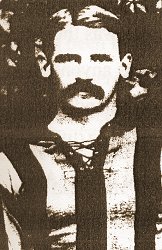
Kenneth Hunt in 1908. |
|
The Directors of the Express and Star
stated that they were willing to personally bear the expense
of having a 'new fangled' telephone line installed between a
small wooden hut in the Crystal Palace ground and their
Queen Street offices. Costing 45/- per hour the telephone
would be used by a correspondent at the match to transmit
the score at regular intervals to the newspaper office in
Wolverhampton. This would be conveyed to the crowd assembled
in Queen St. by it being chalked up on a large blackboard,
which was to be suspended out of an upper-floor window for
all to see. Other commercial interests also used the
occasion for topical publicity, and readers of local papers
were assured by advertisers that the winners would be the
one whose players invested a 'lucky sixpence' to purchase
their cocoa! The 'Oxo' company also exploited the interest
in the Cup by putting on a competition in the local papers.
The prize for the several lucky winners was to be "a free
trip to London and back, with reserved and numbered 5/-
seats at the Palace".
|
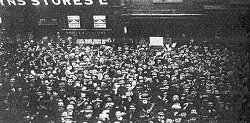
Crowds outside the Express & Star
offices following the progress of the Cup Final. |
The Wolves Trainer, Albert Fletcher, had
endorsed this product by stating "Our players speak highly
of Oxo, and consider there is nothing like it for giving
energy and staying power".
Considering the poor understanding of
food values at that time, there is no reason to think that
beef extract drink did not indeed form an important part of
the team's diet in the build up to the Final.
|
|
With all preparations completed, the
legions of Wolves supporters made their way towards the
metropolis on the many 'special' trains which had been laid
on for that purpose. With the exception of the fortunate
winners of the Oxo competition, the total cost of the day's
outing, including transport and admission price would have
been very nearly the equivalent of an industrial worker's
weekly wage at the time. However, few true supporters would
have let that stop them going to the game.
The team had set off on the morning of
April 25th in a specially commissioned London & North
Western Railway Company train. The engine (named
"Messenger") had been decorated with flags and bunting, and
a sign declaring "Here come the Wolves!".
After many supporters from both sides had
attended a service at St. Paul's Cathedral, undoubtedly all
praying for ''the right result", the crowds made their way
to the Crystal Palace. The weather had been very poor and
totally out of keeping for the time of year. Snow had caused
the cancellation of games at Southampton and Reading and
conditions at the Crystal palace ground were described as
"Rain in torrents and pitilessly driven sleet, alternated
with heavy snow showers"
However just prior to the game the stormy
skies were replaced by bright sunshine. It was surely an
omen that black skies and white snow gave way to golden
'Sunshine on that day, in a way that the black and white
colours of the Northerners would succumb to the 'old gold'
of the Wolves. Watched by less than 75,000, (the smallest
crowd for several years), the game kicked off at the
appointed time under the control of Referee Mr.
T.P.Campbell. The heavy weather had made the embankments
slippery for spectators, but this did not stop one Wolves
fan from appearing in a home made fur Wolf suit. Despite the
effect being somewhat spoilt by the lack of a wolf mask and
the wearer insisting on retaining his flat cap, many must
have envied his outfit on such a cold day! Others at the
game included both the Mayors of Wolverhampton and
Newcastle; Sir Alfred Hickman (the Wanderers President), and
the famous politician A.J. Balfour, (leader of the
Conservative Party and one time Prime Minister of Great
Britain). The initial play heralded dire warnings for the
Midlanders. Skill and training gave way to nervousness and
uncertainty. Newcastle, by far the more composed side,
mounted several early attacks. As if overawed by the big
occasion, Wolves allowed gaps to develop between the
forwards and the half-backs, and these were duly exploited
by the Tynesiders. At the other end of the park Wolves
attackers, Pedley and Radford, had their efforts thwarted by
the Newcastle international defender, Gardner, on several
occasions. The other Wolves' forward, Hedley either slipped
or failed to put in a proper shot when in front of goal,
even though he had already completed a lot of hard work in
receiving long passes and getting the ball under control.
There was a tendency for the Wolves attackers to try and
'walk' the ball into the net, but considering the Newcastle
team's skill and experience this type of play would always
be fruitless. Something dramatic was needed to break the
deadlock and lift the Wolves.
|
| "Cometh the hour, cometh the man" is an old
adage, but never more true when recalling Hunt's actions on that
day so long ago.
After nearly forty minutes, a feeble and messy scramble in
the Newcastle goalmouth saw the ball cleared by a defender's
long kick. It was intercepted by the Oxford graduate who was
standing some forty yards upfield. Hunt's next action
brought him some brief national fame, but more lastingly,
ensured his elevation to the ranks of the all-time heroes of
Wolverhampton Wanderers. |
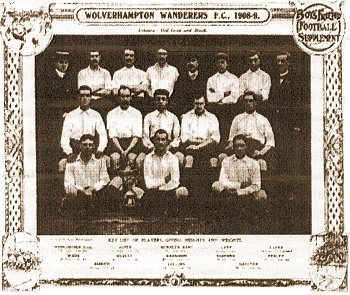 |
| Calmly and thoughtfully Hunt struck the ball
back towards the opposition's goal with such ferocity that the
Magpie's goalkeeper could do nothing but embarrassingly palm the
ball into his own net. Hunt's goal has been described as
'speculative' and even 'lucky' by analysts who reason that he
was not a proven or regular goal-scorer and was not in the habit
of trying long range shots. There may be some truth in
long-range shots. There may be some truth in this as it was the
only goal he scored for Wolves that season, but what a time to
score it! His reason for trying a shot will never be known, but
more important was the effect that it had on the rest of the
Wolves' players. The team suddenly believed in itself and the
vague possibility of a win became an almost certainty as the
Wolves piled on the pressure. Whereas before Hunt's goal almost
nothing had gone right, now the Midlanders could hardly put a
foot wrong. The Wanderers hustled, bustled, jockeyed their foes
and fought for every ball, grasping at half chances at every
opportunity. The Newcastle team were taken aback at this newly
found dynamism from the team that they had so recently dismissed
as 'no hopers', and were at a loss in knowing how to handle the
Wolves determination and aggression. Hunt himself led the way in
maintaining the pressure. His speed and power were phenomenal,
and Wilson, one of the Geordies who was detailed to mark him
ended up 'doing the splits' whilst attempting to catch Hunt who
was running with the ball.
The Molineux men went further ahead in the 'second half
through Hedley and Harrison, before exertion and strain
started to take its toll. Newcastle managed to score in the
dying minutes of the game through Howie, but by then it was
far too late for the Magpies to salvage anything more than a
little pride from a game that they expected to win so
easily. (Apart from scoring for Wolves, Billy Harrison would
have greater reason to remember that day, for whilst he was
playing at Crystal Palace in the Final, his wife was back in
Wolverhampton giving birth to triplets! Strangely Howie's
goal for Newcastle meant that all the players on the park
that day whose surnames began with the letter 'H' managed to
score).
The final whistle was greeted by scenes of wild excitement
on the Crystal Palace terraces. Wolves fans cheered
themselves hoarse as the Lord Mayor of London, Sir Henry
Bell, handed the trophy to Wooldridge, the Wolves skipper,
who boastfully declared to loud applause that it would not
be the last time that he would have the honour of receiving
it. (Sadly it was!) Newcastle took their surprising defeat
in good part as W. Hudson, M.P. for Central Newcastle, gave
an impromptu speech in which he congratulated the Wanderers.
Although unexpected, Wolves victory was very popular in
various parts of the country. |

Wolves victory is hailed in the Daily
Mirror. |
At a match on Merseyside between Everton
and Sheffield Wednesday, (the Finalists from the previous
year), the underdogs' victory was greeted with great cheers.
The news of Wolves success was greeted in
Wolverhampton by scenes of great excitement, especially
outside the Express & Star offices in Queen Street, where
crowds had been arriving by tram all afternoon to hear
reports on their team's progress. Spotted amongst the crowd
was the Reverend Robert Hunt, Kenneth's father, who was as
keen as anyone was to hear the news from London. In what was
considered an outlandish display of fanaticism for the
victorious team, a resident of Park Village devised a flag
in Wolves colours and hoisted it up outside his house.
|
|
At Dudley and West Bromwich the news
caused crowds to congregate on the streets to excitedly
discuss the victory.
In true sporting spirit the Wolves Board
received a congratulatory telegraph from West Bromwich
Albion, and this was duly published in the
local press. Other local reactions to the victory were
somewhat strange. In a letter to the editor of the Express &
Star one correspondent advocated a change in Wolves colours
away from the "dowdy and dull gold and black" to a more
cheerful red, which would be more fitting for a winning
side. (perish the thought!)
There has been much debate about the
reasons Wolves won this famous Cup Final. There was no doubt
why the local newspapers thought that Wolves had been
victorious. Quite simply they stated "Wolves won because
they were superior!... The Wolves were the keener team, they
had more of the game and were deadlier at goal they won the
last yard every time."
This may be true of the latter part of
the game, but it could not be said of their performance
throughout the ninety minutes. A great deal was made of the
fact that the Wolves team was made up of not only 'local'
men, (which it wasn't! e.g. Hedley had been born in Durham),
but more to the point of 'Englishmen'. Rather pompously,
local sources felt it fitting that the 'English Cup' should
be won by an 'English team'.
This was a rather churlish swipe at
Newcastle who had fielded several Scottish signings amongst
their Final line-up. The national press was not so
jingoistic or partisan in their appraisal of the game, and
singled out Kenneth Hunt for particular praise. Papers like
the Daily Mail described his play as 'classy' and 'stoic',
and others identified his enthusiasm, tenacity and example
as being the key to the ‘Wanderers’ success. When
interviewed later, Hunt himself modestly stated that Hedley
was the shining example of the Wolves team, and further
played down his own part in events by stating that Newcastle
had the "cleverest half-backs" in the game. In his opinion
Wolves had won because their game plan was simple. “We
hustled” he said, “We only ever intended to hustle". He also
later summed the game up mathematically. "Newcastle played
75% of the football - we scored 75% of the goals!"
Hunt's popularity as a local hero to the
people of Wolverhampton now knew no boundaries. He and the
rest of the team were mobbed when they rather unwisely tried
to stop at St.Mark's Vicarage for "light refreshments".
Whilst parading the trophy through Wolverhampton two days
after the game Kenneth Hunt was then carried on the
shoulders by jubilant fans up to the Molineux Hotel whilst
the crowd sang a popular song of the time "The Boys of the
Old Brigade".
Hunt was always a very competitive
player, and has been described "as hard as teak", but his
reputation for fairness with the Wolverhampton public had
been high since the Swindon match. A collision between Hunt
and an opponent called Chambers had resulted in the latter
being taken into hospital. In true sporting spirit Kenneth
Hunt had taken a considerable detour on his journey from
Wolverhampton to Oxford to twice visit the man and enquire
as to the progress of his recovery.
There was a strong local pride in Hunt's
triumph and people wanted to show how living in
Wolverhampton had helped him. This feeling was articulated
in the month following the Final, at the annual Dinner of
the Grammar School Old Boys' Association, (the 'Old
Wulfrunians'). G. Bancroft, who had been a contemporary of
Hunt at the school six years earlier, stated unequivocally,
(but rather too simplistically,) that the Wolves' hero had
"learnt his craft as a footballer at the Grammar School, and
not at Trent College".
So, what is the true significance of the
1908 Cup victory and Kenneth Hunt's part in it. The game
itself certainly brought fame to the Club. The Wolves of
1908 were to have the distinction of becoming one of the
last winners of the F.A. Cup of that time, which itself was
a replacement for the original trophy, which had been stolen
in 1895.
The 1908 Cup, which had cost £20 and was
rightly entitled the 'English Cup' was replaced in 1911 by
the present trophy because the design had been pirated. The
old trophy was presented to Lord Kinnaird, the President of
the F.A. who had witnessed the Cup Final of 1908 and was a
man whose record number of Cup Winners medals has never been
surpassed. The Express and Star saw the success in terms of
potential publicity for the town and noted that it was
important that the game had showed the London public what
the Wolves could do.
Probably the most significant fact was
that Wolves benefited financially to the tune of £3,000,
which went along way to easing their financial worries, and
probably saved them from subsequent bankruptcy in the period
before the Great War.
In personal terms the game indicated
Kenneth Hunt's love of the Wolves. He had been selected to
represent England against Wales at that time, but had
declined the offer, preferring to turn out for Wolves in the
Final. For Kenneth Hunt the victory brought him immediate
opportunity and lasting respect and fame. Within six months
he had been selected to play for the victorious Great
Britain side in the London Olympic Games Football
Competition. By being a member of the side that
defeated-Denmark 2-0
in the Final, (in what was described as a "poor game"),
Hunt had achieved the unique and honourable distinction of
winning an Oxford 'Blue', F.A. Cup Winner's Medal and
Olympic Gold Medal all in a twelve month period.
Although he later achieved other
successes, such as England Caps and a Runners-Up Medal in
the Amateur F.C. Cup with Oxford City four years later, his
career as a footballer could never again reach such dizzy
heights.
Hunt played for the Wolves for one more
full season before moving on to Leyton Orient and Oxford
City, although he returned to Molineux on occasion. He
planned to return to the Molineux to play a final couple of
full games in Wolves' colours in the Spring of 1920, almost
twelve years to the day that the Club had won the Cup, but
due to his uncle Joseph's sudden death, his appearance was
limited to a single game. Wolves were again going through a
very severe financial crisis, and there were public meetings
held in which the resignation of the Board was called for.
Despite this, over 15,000 people turned
up to see the thirty six year old Clergyman lead Wolves to a
fine 4-0 victory over County neighbours, Stoke City. In all
Kenneth Hunt played 61 times for the Wolves, including a
Charity Match in 1916. He often turned out for Wolves during
vacations from his teaching post at Highgate School. His
final appearance at Molineux was during the Second World War
when he played in a practice match, even though he was well
into his fifties!
For a time Hunt had become the archetypal
Edwardian hero. His display of grit and determination
against great odds endeared him to the English people before
the holocaust of the Great War caused them to them to become
more uncertain about the World and their place in it. Apart
from his awards and medals, Hunt still holds the distinction
of being the last of only three amateur players to win an
F.A. Cup Winners Medal once professionalism had been
legalised. He also has the distinction of still being the
oldest man to represent England at International level,
whilst remaining totally amateur. (This was in the Antwerp
Olympics of 1920 when at the age of 34 he played against
Italy and France). Perhaps the most enduring reminder of
Kenneth Hunt is in the hearts of all true football fans when
they read about the past glories of the game. In this way,
even though he was not a priest at the time, the 'Reverend'
Kenneth Hunt's name, fame and reputation will live on
forever.
|

|

|

|
Return
to
Chapter 3 |
Return
to
the contents |
Proceed
to
Chapter 5 |
|